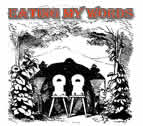![]()

After a study covering 430 patients, (says The [London] Daily Telegraph) the claims that alcohol protects against heart disease were criticized. The report's authors found that, for those who already had heart disease, even moderate drinking made it worse.
Oh dear. Just as we were settling into the salubrious comforts of the Mediterranean Diet, a posse of New Age temperance workers rides into town wielding, not hatchets, but statistical tables to demonstrate that our brief moment on earth may be marginally extended by making it less endurable. Another study goes so far as to suggest that a drastically reduced caloric intake will in itself stave off the diseases of old age, and even keep the grim reaper waiting in the antechamber. The last thing our overcrowded planet needs is more human beings, and yet we steadily swell its population with a rising proportion of the superannuated, many of whom survive only because they can no longer reach out for a bottle or a weapon.
Medical research is now focused on squeezing in every possible nanosecond of longevity, whatever the cost in life-long pleasure. In the bloated world of commerce and consumption, we have shifted the emphasis from quality to quantity of life. In the Caucasus Mountains of southern Russia the inhabitants are purported to live to an advanced age by eating huge amounts of the local yoghurt, and so enterprising salesmen peddle imitations to the gullible as the Elixir of Life. If you're really into longevity, then go lead the rigorously Spartan life of those lean muscular Caucasians, but don't bitch if you grow tired or bored.
We enthusiastically endorse the capitalist principle of built-in obsolescence as it applies to our constantly shifting theories of medicine, but refuse to relate it to our inexorably mortal selves. Does consumption of the animal fats we have eaten through the ages now threaten a premature demise? Then forego the morning pleasure of melted butter over steaming poached eggs and lightly toasted ciabata: omit the cholesterol-laden egg and choke down the dry crust with a scraping of vegegrease. Eschew the lethally calorific cassoulet with its bubbling goose fat and dine instead on cottage cheese and carrot sticks, satisfying your frustrated cravings with surreptitious orgies of "low fat" junk food so revoltingly medicinal that it must, in some perverse fashion, be doing you good. Empty out your cellar and then wash down your meal, not with Adnam's Ale, but Adam's. If your food and drink are sufficiently austere, you will no longer feel the urge to overindulge, and the pounds will slip away as if anticipating the inevitable moment when the flesh begins to dissolve of its own accord.
Not content with discovering new dangers in our traditional diet, we create poisons where none had existed. Our greedy methods of overproduction induce lethal side-effects that even the state has been forced to acknowledge. Officials solemnly warn us that certain age-old foods must now be "properly" prepared, or given up altogether. Omelettes, soufflés, mayonnaise, soft meringues, beef-on-the-bone, ox-tail soup, brains, unbleached tripe, unpeeled apples and carrots-these may no longer be consumed with impunity.
But there are certain advantages to being past the age of reproduction. Kreutsfeld-Jakob Disease, we are told, takes years to reveal itself. Bring on the steak tartare. What other terrors are waiting in the wings? No matter; long before they shuffle onstage, I will have succumbed to the one ailment for which science, thank heavens, has yet to discover a remedy.
In a world in which our most personal needs are met by corporations, the ancient arts and crafts, including cuisine, may still allow us to assemble things out of elemental materials. But these are increasingly hard to find: paints come ready-mixed, music blares from boxes, words are corrupted by misuse, foodstuffs are cloned to anonymity. If you want real food you must either grow it yourself (tricky in the case of cattle or crustaceans) or pay the luxury prices once attached only to truffles and caviar. In this crazy inverted world of "added value", the less a thing is processed, the more it costs.
Having assembled your stockpile of honest comestibles, you must then set about making them so delicious as to justify the effort and extravagance. This is impossible if you eliminate every natural ingredient that is currently thought to react unfavorably with the body's chemistry. By avoiding them you may indeed delay your departure at the expense of pleasure, but the ultimate fact of life on earth is mortality-unannounced, unmerited, excruciating.
Perhaps you've chosen to prepare yourself for an afterlife in which self-denial will be rewarded. If you've wagered correctly, it will have been worth any sacrifice (though perhaps it may prove to be as rigorous, for all eternity, as peasant life in the Caucasus). But if like me you suspect that this brief moment on earth encompasses all the pleasure you'll ever know, then you may want to set about maximizing it, while taking care not to leave a legacy which is a shame or a curse.
So keep your senses keen. Age is in itself sufficiently destructive of sight, taste, smell and hearing without overstimulating them to premature narcosis. Don't become inured to bad sounds, bad flavors or bad art. Shudder unashamedly when a politician or an executive opens his mouth. Turn off the soundtrack when the TV ads begin. Avoid ear-assaulting rock concerts. Patronize locally owned, Musak-free stores that sell honest goods in blessed silence. And don't eat fake food wrapped in plastic: sit down to traditional home-cooked fare that tastes as good as you can make it, even if a man in a white coat solemnly warns you that a ton of it could kill a rat.
©1998 John Whiting, Diatribal Press, London